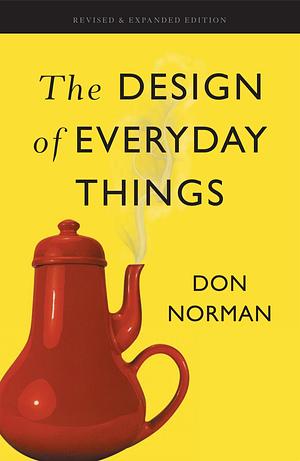Take a photo of a barcode or cover
Readalong
The Design of Everyday Things: Revised and Expanded Edition
Hosted by xoruby
15 Apr 25 - 30 Jun 25 |
10 participantsAbout
Among a community of designers working in software and UX, we discovered The Design of Everyday Things topped many designers’ “to read” list, but few had read it before. First published in 1988 as The Psychology of Everyday Things, the book turns 40 soon. Wild!
Oft-cited in design communities as a top book on design, it explores and defines design as more than mere aesthetics. Design exists as a layer of communication and interaction between object and user. Norman believes that blaming users when something goes wrong with technology is misguided. What we often boil down to “human error” is more often the result of bad communication between humans and machines.
Norman writes in the preface:
One goal is to turn readers into great observers of the absurd, of the poor design that gives rise to so many of the problems of modern life, especially of modern technology. It will also turn them into observers of the good, of the ways in which thoughtful designers have worked to make our lives easier and smoother. Good design is actually a lot harder to notice than poor design, in part because good designs fit our needs so well that the design is invisible, serving us without drawing
attention to itself.
Especially in an age of Alexas and voice assistants listening to our conversations, algorithmic filters biasing and influencing what media we consume, and the derivative output of a tech toolbox overstuffed with AI features, being able to see design has never been more important. A design’s invisibility may no longer be the marker of success it was when Norman first wrote this book.
But still, it's hard not to agree with Norman—that “we are all designers in the sense that all of us deliberately design our lives, our rooms, and the way we do things. We can also design workarounds, ways of overcoming the flaws of existing devices. So, one purpose of this book is to give back your control over the products in your life.”
But still, it's hard not to agree with Norman—that “we are all designers in the sense that all of us deliberately design our lives, our rooms, and the way we do things. We can also design workarounds, ways of overcoming the flaws of existing devices. So, one purpose of this book is to give back your control over the products in your life.”
Whether you’re working as a professional designer or if you’re just design-curious, we hope you’ll join us in this XO Ruby readalong of The Design of Everyday Things.
Forums
Preface + Chapters 1 & 2
Target: 19 May 2025
Welcome to this community readalong! We would like you to take the opportunity to introduce yourself here in the comments.
- What's your experience level with design?
- Where are you located geographically?
- What's one other fact that other folks should know about you?
- What's a quote or concept from the Preface, Chapter 1, or Chapter 2 that stood out to you? Why?
Chapters 3 & 4
Target: 02 Jun 2025
Forum unlocked when you reach 33% in the book
Chapters 5-6
Target: 16 Apr 2025
Forum unlocked when you reach 59% in the book
Chapter 7
Target: 30 Jun 2025
Forum unlocked when you reach 81% in the book
